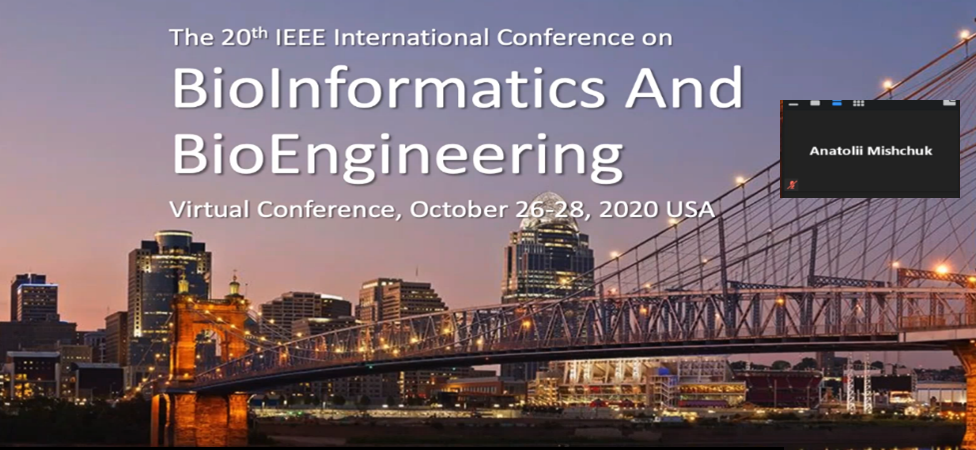"virtual conferences are a place where a student can gain incredible knowledge"
I had the great opportunity to be a participant of the 20th IEEE International Conference on BioInformatics And BioEngineering. Due to the situation in the world the BIBE Organizing Committee and the IEEE Computer Society made the decision to keep the 20th IEEE BIBE 2020 Conference in place, but as a virtual event. Each day of the conference was held as a separate Zoom meeting room. Twenty minutes were allotted for each conversation, with 15 minutes for presentation of the topic, followed by 5 minutes of questions.
The organization of the conference was at the highest level. The organizers sent a letter in advance "BIBE 2020 - Instructions for Attendees" and a list of topics for each day of the conference. A discussion board was also created in the platform Slack. If you wanted to ask any questions, you could join the platform at the appropriate link.
After listening and analysing the three days of the conference, I feel that I have received up-to-date information in the field of BioInformatics And BioEngineering. All proposed topics were disclosed in full. I observed a high level of interest from the audience, who asked the speakers many questions.
Given the fact that every day was opened up for discussion in 3 rooms, I had to choose one direction of discussion daily. On the first day, after the opening ceremony of the conference, I chose the direction "Health Care". I was most interested in the topic "Multi-task Survival Analysis" by the researcher Lu Wang of the Department of Computational Medicine and Bioinformatics, University of Michigan. The researchers proposed a unified framework for multi-task survival analysis, which extends the concept of multitask learning to survival analysis. In the future, they plan to develop more advanced multi-task survival analysis methods, which can take the domain knowledge into account during the problem formulation.
The second day was the hardest for me because the research topics were specific and difficult for me to understand, but I became determined to study and understand them. Luis Torres proposed a model able to predict novel compounds according to a degree of similarity between molecules. He demonstrated how a one-shot-based Siamese Neural Network allows us to outperform state-of-the-art models in accurate and reliable prediction of pharmacological analogs for drug discovery applications.
On the third day I chose the topic Rehabilitation Center/Devices-3. I want to single out such topics that are extremely relevant today: "Wearable CSRR-based Sensor for Monitoring Glycemic Levels for Diabetics", "A machine learning pipeline for predicting joint space narrowing in knee osteoarthritis patients", and "Motor data analysis of Parkinson’s disease patients".
Summing up the three days of this incredible experience, I want to say that virtual conferences are a place where a student can gain incredible knowledge. I am delighted with the level of organization of this conference, so I express my gratitude to the organizers of the 20th IEEE BIBE 2020 Conference, researchers, participants, and the U.S.-Ukraine Foundation Biotechnology Initiative for the opportunity to gain incredible knowledge and emotions.
-Anatolii Mishchuk, master's degree student majoring in pharmaceutical biotechnology at the National University of Food Technologies

